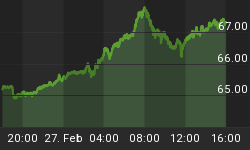If there is one consistent theme we have expressed in these pages it is the view that rising commodity prices and falling financial assets tend to make people pissed off. So it is no wonder that President Bush's job approval ratings are at their lowest point of his presidency as oil heads into a Wave III top which we predicted last year to top around $60. Obviously, we underestimated it.
Longtime readers will recall that in September 2002 we accurately called the White House out on their propaganda offensive as they lied the world into Iraq. The news media on the left and right fed Americans a diet of "panem et circenses" and the countdown to war was as eagerly anticipated as the dropping of the ball in Times Square.
What we suspected two years ago was only recently corroborated by the Downing Street memos and even though there has been a virtual media blackout on this news the collective opinion has shifted from positive to negative with 58% of U.S. adults now expressing a negative opinion of the President. The war in Iraq and the economy are the top two issues Americans say are most important for the U.S. to address - not terrorism, mind you.
Below is the a graph of the President's disapproval rating which climbed to a record high of 58% last week.

We have maintained a firm view about the war from a financial perspective - not political - all along. First let us say that our viewpoints are entirely independent. We do not read the papers, magazines or trade journals and the TV is never on in the trading room. We rely on a variety of websites that post headlines, which can be scanned every hour or so for interesting developments.
BUT - and this is the main point - we do not isolate our reading to purely financial related commentary. The reason is that the markets ebb and flow like any organism and are influenced by the behavior of crowds. Therefore, sometimes it is not the story that counts but the "interpretation" of the event that is spun by the media, which is a direct reflection of social mood.
For instance, we were able to stand undaunted by our bullish dollar forecast in December because the evidence was overwhelming that people who do not trade the markets were convinced of the dollar’s demise. So strong is this opinion still that three months ago while in Chicago an ordinary salesman gave unsolicited advice to your editor that the dollar was doomed to a "50-year collapse." Anyone that trades the markets knows that the hardest thing to get right is the timing AND direction, but here was an ordinary salesman offering both.
We take a similar view on the war. We forecasted long ago that rising negative opinion about the war in Iraq would NOT be about fallen GIs - as we would like to think it is. Instead, war is hell and the public had until recently condoned the MessInPotamia. What has changed is higher gas prices in recent months - and the mob is getting restless.
The "something for nothing fallacy" that the mob relies on is also intrinsic to the success of Socialism and Big Brother. And with the transition from capitalism to Empire in the US comes a price - Inflation and Taxation. Longtime readers may recall our study of Federal income taxation that proved that when times get tough, the government takes care of itself first and its citizens second.
Below is a chart of the highest marginal tax rate from our March 27, 2005 Head of the Trend newsletter.

Note how the highest marginal tax rate moves inversely to the stock market. Tax rates plummeted in the roaring 1920s then surged in the Great Depression. Marginal tax rates then peaked at the summit of the inflation adjusted Dow in 1965, then stayed at 70% while inflation raged in the 1970s, thereby effectively raising the inflation adjusted basis of taxation back to 90%. Tax rates then fell through the entire 1980-2000 Bull Market, as one would expect. The recent decline in taxes has been a mirage as it was offset by record deficits.
So it was not lost on us when the Pentagon last week changed the lexicon from "war on terrorism" to "war on violent extremism." With that seemingly trivial shift, the government can now silence dissent by using the Patriot Act against citizen unrest. If things get really out of hand (like gold going to $700 as we predict) the government will simply raise taxes to counteract the loss.
In conclusion, the fact that neither the war nor the economy is perceived as going well suggests that higher commodity prices will eventually precipitate into a crisis. The end result we think will be another terrorist attack on US soil.















